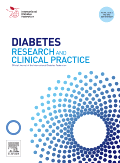
DIABETES CARE
Scope & Guideline
Advancing diabetes research for a healthier tomorrow.
Introduction
Aims and Scopes
- Clinical Management of Diabetes:
Research on the latest clinical practices and guidelines for managing diabetes, including pharmacological and non-pharmacological interventions. - Diabetes Complications:
Studies focusing on the prevention, diagnosis, and treatment of complications associated with diabetes, such as retinopathy, nephropathy, and cardiovascular diseases. - Epidemiology and Public Health:
Investigations into the prevalence, risk factors, and social determinants of diabetes and its complications, highlighting disparities in health outcomes. - Technology and Innovation in Diabetes Care:
Exploration of new technologies for diabetes management, including continuous glucose monitoring, insulin delivery systems, and telehealth solutions. - Psychosocial Aspects of Diabetes:
Research addressing the psychological, social, and behavioral aspects of living with diabetes, including diabetes distress and mental health. - Nutrition and Diabetes:
Studies examining the role of dietary patterns, nutritional interventions, and their impact on diabetes management and prevention.
Trending and Emerging
- Diabetes and COVID-19:
Numerous studies have emerged examining the intersection of diabetes with COVID-19, focusing on increased risks, complications, and management strategies during the pandemic. - Health Equity and Disparities:
Research addressing health inequities in diabetes care, including socioeconomic, racial, and geographic disparities, is gaining more attention. - Mental Health Integration:
An increasing number of articles explore the integration of mental health care into diabetes management, recognizing the importance of addressing psychosocial factors. - Telehealth and Remote Monitoring:
The adoption of telehealth and remote monitoring technologies for diabetes management has surged, driven by the need for accessible care during the pandemic. - Artificial Intelligence and Machine Learning:
The application of AI and machine learning in predicting diabetes outcomes and personalizing treatment is a rapidly emerging area of research. - Gut Microbiome Research:
Investigations into the role of the gut microbiome in diabetes pathogenesis and management are becoming more prominent, highlighting the complex interplay between diet, metabolism, and diabetes.
Declining or Waning
- Traditional Lifestyle Interventions:
There has been a notable decrease in studies solely focused on traditional lifestyle interventions (e.g., diet and exercise) without integration of technology or innovative approaches. - Single-Agent Pharmacotherapy Studies:
Research specifically examining the efficacy of single-agent diabetes medications is less frequently published, as there is a growing trend towards combination therapies and personalized medicine. - Basic Science Research:
The amount of basic science research related to diabetes pathophysiology has diminished, with more emphasis placed on translational and clinical studies. - Longitudinal Cohort Studies:
There appears to be a waning interest in long-term cohort studies that do not incorporate newer technologies or comprehensive data analytics.
Similar Journals

DIABETOLOGIA
Pioneering discoveries in diabetes and metabolic health.DIABETOLOGIA is a leading journal in the field of endocrinology and diabetes research, published by Springer since its inception in 1965. With an impactful presence in both Internal Medicine and Endocrinology, Diabetes and Metabolism, it is recognized in the Q1 quartile rankings for 2023, underscoring its significance and contribution to these disciplines. The journal holds impressive Scopus rankings, placing it in the top 5% of journals in its categories, making it an essential resource for researchers, healthcare professionals, and students dedicated to advancing knowledge and practices in diabetes care and management. DIABETOLOGIA publishes a range of peer-reviewed articles, original research, and reviews that address the latest scientific developments, clinical practices, and therapeutic innovations, contributing to the global discourse on diabetes and its related health implications. Although it does not offer Open Access options, its rigorous selection process guarantees the quality and relevance of the content, solidifying its position as a reliable reference for contemporary research. For those looking to stay at the forefront of diabetes science, DIABETOLOGIA is a vital communique in the ever-evolving landscape of medical research.

International Journal of Diabetes in Developing Countries
Elevating diabetes understanding in the heart of India.The International Journal of Diabetes in Developing Countries, published by SPRINGER INDIA, stands as a pivotal resource in the field of diabetes research, particularly focusing on the challenges and advancements in diabetes management within developing nations. With an ISSN of 0973-3930 and an E-ISSN of 1998-3832, this journal has been fostering knowledge exchange since its inception in 2001, converging its focus over multiple years to maintain relevance through 2024. As a peer-reviewed journal, it holds a significant position within the Q4 category of Endocrinology, Diabetes and Metabolism and Q3 in Internal Medicine, showcasing its commitment to addressing critical issues regarding diabetes care in diverse populations. The journal is crucial for researchers, healthcare professionals, and students seeking to further their understanding of diabetes in resource-limited settings. Although it operates without an open access model, the journal ensures rigorous peer review, maintaining high academic standards that benefit the growing field of diabetes research. With its address located in the heart of New Delhi, India, this publication serves as a vital repository for valuable insights and innovative strategies aimed at combating diabetes in developing countries.

Journal of Diabetes Research
Connecting researchers to combat diabetes challenges.Journal of Diabetes Research, published by HINDAWI LTD, is a leading open-access journal dedicated to advancing the understanding and management of diabetes. Established in 2013, the journal has swiftly gained recognition, achieving a commendable Q2 ranking in both the categories of Endocrinology and Diabetes and Metabolism, as well as in Biochemistry, Genetics and Molecular Biology. With an impressive Scopus ranking of #42 out of 244 in its field, the journal provides a platform for cutting-edge research that addresses the multifaceted challenges posed by diabetes. Offering unrestricted access to its articles since its inception, the journal aims to foster collaboration and exchange of innovative ideas among researchers, clinicians, and students worldwide. It is particularly vital for those engaged in diabetes research, as it publishes influential studies that impact clinical practices and enhance patient outcomes. For academics and professionals seeking to contribute to the growing body of knowledge in diabetes, the Journal of Diabetes Research serves as a valuable resource.

Nutrition & Diabetes
Advancing the Science of Nutrition and MetabolismNutrition & Diabetes is a leading open-access journal published by SPRINGERNATURE that has been at the forefront of research since its inception in 2011. With a dedicated focus on the intricate relationship between nutrition and metabolic disorders, this journal serves as an essential resource for researchers, healthcare professionals, and students committed to advancing knowledge in the fields of endocrinology, diabetes, and internal medicine. The journal is recognized for its high impact, reflected in its prestigious Q1 ranking in both Endocrinology, Diabetes and Metabolism and Internal Medicine, as well as its strong performance in Scopus rankings, placing it within the top echelons of related disciplines. Based in the United Kingdom, Nutrition & Diabetes is committed to publishing high-quality, peer-reviewed research that addresses current challenges and innovations in nutrition science and metabolic health. Open Access since 2011, the journal promotes the dissemination of critical findings, ensuring that vital research is accessible to a global audience, thus driving further advancements in this important and evolving field.

DIABETES RESEARCH AND CLINICAL PRACTICE
Fostering collaboration to elevate diabetes management.DIABETES RESEARCH AND CLINICAL PRACTICE, published by Elsevier Ireland Ltd, is a leading peer-reviewed journal in the realms of endocrinology, diabetes, and internal medicine. With a prestigious Q1 classification across several categories, including Endocrinology, Diabetes and Metabolism, and Internal Medicine, this journal is recognized for its impactful contributions to advancing knowledge and clinical practice in diabetes care, boasting an impressive impact factor that underscores its significance in the academic community. Spanning from 1985 to 2024, this journal not only disseminates high-quality research but also serves as a critical resource for healthcare professionals, researchers, and students alike who are focused on addressing the global diabetes epidemic. With its comprehensive scope and commitment to fostering innovative findings, DIABETES RESEARCH AND CLINICAL PRACTICE remains at the forefront of its field, fostering collaboration and discovery to improve patient outcomes.

ACTA DIABETOLOGICA
Connecting Innovators in EndocrinologyACTA DIABETOLOGICA, published by SPRINGER-VERLAG ITALIA SRL, is a distinguished peer-reviewed journal dedicated to the rapidly evolving fields of endocrinology, diabetes, and metabolism. With an impressive convergence of research from 1991 to 2024, it is recognized for its significant contributions, boasting a Q1 ranking in Internal Medicine and Q2 rankings in Endocrinology categories as of 2023. Its Scopus rankings further highlight its impact, placing it in the 81st percentile in Internal Medicine. The journal serves as a vital platform for professionals and researchers, facilitating the dissemination of innovative findings and fostering a comprehensive understanding of metabolic disorders. Although the journal is not open access, it remains an essential resource, ensuring high visibility and accessibility of critical research to its scholarly audience.

Diabetologie und Stoffwechsel
Transforming the Landscape of Diabetes ManagementDiabetologie und Stoffwechsel is a prominent academic journal specializing in the fields of endocrinology, diabetes, and metabolism, published by GEORG THIEME VERLAG KG. Since its inception in 2006, this German journal has strived to disseminate cutting-edge research and innovative findings that advance the understanding of metabolic disorders and the management of diabetes. With an ISSN of 1861-9002 and an E-ISSN of 1861-9010, it caters to a diverse audience ranging from researchers to healthcare professionals and students in the medical field. While it currently holds a Q4 ranking in the 2023 Scopus quartiles for its area, the journal serves as a critical platform for emerging insights and discussions impacting diabetes care and research, fostering collaboration and knowledge-sharing in a rapidly evolving landscape. The convergence of its coverage until 2024 signifies a commitment to ongoing exploration into the complexities of metabolic health, making it a valuable resource for anyone passionate about these vital areas of health.

Diabetes Stoffwechsel und Herz
Bridging Diabetes Research and Cardiology for Better HealthDiabetes Stoffwechsel und Herz, published by VERLAG KIRCHHEIM, is a distinguished journal that focuses on the interdisciplinary field of diabetes research, cardiology, and metabolic disorders. With its dedicated approach, the journal aims to disseminate cutting-edge findings and foster innovative discussions among researchers and practitioners in the healthcare community. Despite its discontinuation in Scopus coverage since 2017, the journal continues to hold significance in advancing knowledge regarding the intricate relationship between diabetes and cardiovascular health. It offers researchers a platform to explore the biochemical, genetic, and clinical aspects of endocrinology, while also catering to the needs of professionals aiming to apply the latest research in their practice. The journal’s rankings, which place it in the lower percentiles across various relevant categories, reflect a unique opportunity for contributors looking to impact a niche yet vital area of medicine. As the field evolves, Diabetes Stoffwechsel und Herz remains committed to enriching the dialogue surrounding these critical health issues.

DIABETES
Empowering research, enhancing patient outcomes.DIABETES, published by the American Diabetes Association, is a premier journal in the field of endocrinology, diabetes, and metabolism, renowned for its rigorous peer-reviewed research since its inception in 1952. With an impressive impact factor and classified in the Q1 category for both Endocrinology, Diabetes and Metabolism and Internal Medicine as of 2023, it holds a prestigious position within the scholarly community, ranked 17th out of 244 in its specialization. The journal's objective is to disseminate cutting-edge research and advance scientific understanding to ultimately improve diabetes patient care and management. While it does not offer open access options, the journal remains a vital resource for researchers, professionals, and students involved in diabetes-related studies. The ongoing dedication to excellence by the authors, reviewers, and editors ensures that DIABETES continues to be a pivotal platform for innovation and knowledge in the fight against diabetes.

Diabetes Technology & Therapeutics
Leading the Charge in Diabetes Technology and TreatmentDiabetes Technology & Therapeutics is a leading journal published by MARY ANN LIEBERT, INC, dedicated to advancing the field of diabetes management through innovative technologies and therapeutic strategies. With an impressive impact factor and recognized as a Q1 journal in Endocrinology, Diabetes and Metabolism, as well as Medical Laboratory Technology, it occupies a pivotal position in the academic landscape. This esteemed publication features a comprehensive range of articles that cover cutting-edge research, clinical applications, and developments in diabetes care from 1999 to 2024, making it a critical resource for researchers, health professionals, and students alike. The journal is committed to fostering dialogue between disciplines, especially given its strong rankings in various scientific categories including the 98th percentile in Medical Laboratory Technology. By opting for subscription-based access, readers gain insight into the latest innovations that are shaping diabetes technology and treatment paradigms, thereby enhancing patient outcomes and advancing the scientific community's understanding of this complex disease.